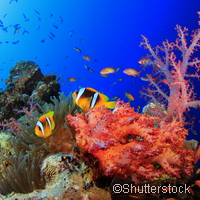Limit climate change to save coral reefs
Almost all coral reefs are expected to be subject to severe degradation - that is unless action is undertaken to mitigate greenhouse gas emissions. It is also assumed that corals can adapt at extremely rapid rates. But even if all the assumptions are correct, only two thirds of the coral reefs will be safe according to a study recently published in the journal Nature Climate Change. Given the important role that coral reefs play in the marine ecosystem, these findings are alarming. It is estimated that coral reefs house almost a quarter of the species in the oceans and provide critical services such as coastal protection, tourism and fishing to millions of people worldwide. All these services could be at risk as global warming and ocean acidification, both driven by human-caused carbon dioxide (CO2) emissions, pose a major threat to these ecosystems. According to the study, even if climate change is mitigated, coral reefs will suffer and will no longer be the vibrant ecosystems that we now know them to be. 'Our findings show that under current assumptions regarding thermal sensitivity, coral reefs might no longer be prominent coastal ecosystems if global mean temperatures actually exceed 2 degrees Celsius above the pre-industrial level,' says lead author Katja Frieler from the Potsdam Institute for Climate Impact Research. 'Without a yet uncertain process of adaptation or acclimation, however, already about 70% of corals are projected to suffer from long-term degradation by 2030 even under an ambitious mitigation scenario.' If coral reefs are to be protected, mean temperature increases have to be kept below 1.5 degrees Celsius. The study, conducted by scientists from Potsdam, the University of British Columbia in Canada and the Universities of Melbourne and Queensland in Australia, according to the researchers, is the first comprehensive global survey of coral bleaching to express results in terms of global mean temperature change. The research team used an extensive set of 19 global climate models to project the cumulative heat stress at 2,160 reef locations worldwide. They then applied different emission scenarios covering the 21st century and multiple climate model simulations; in total more than 32,000 simulation years were diagnosed allowing for a more robust representation of uncertainty than any previous study. Corals derive most of their energy from a close symbiotic relationship with a special type of microalgae. The symbiosis between coral and algae can break down when stressed by warm water temperatures, making the coral 'bleach' or turn pale. Though corals can survive this, if the heat stress persists long enough the corals can die in great numbers. 'This happened in 1998, when an estimated 16% of corals were lost in a single, prolonged period of warmth worldwide,' says Frieler. Optimistic assumptions were included in the study to account for a possible acclimation or adaptation of corals to thermal stress, like shifts to symbiont algae with a higher thermal tolerance. 'However, corals themselves have all the wrong characteristics to be able to rapidly evolve new thermal tolerances,' says co-author Ove Hoegh-Guldberg, a marine biologist at the University of Queensland in Australia. 'They have long lifecycles of 5-100 years and they show low levels of diversity due to the fact that corals can reproduce by cloning themselves. They are not like fruit flies which can evolve much faster.' Past studies estimated the impact of thermal adaptation on bleaching thresholds, but not the possible opposing effect of ocean acidification. Seawater gets more acidic when taking up carbon dioxide (CO2) from the atmosphere. This is likely to act to the detriment of the calcification processes crucial for the corals' growth and might also reduce their thermal resilience. The new study investigated the potential implication of this ocean acidification effect, finding that, as Hoegh-Guldberg says, 'The current assumptions on thermal sensitivity might underestimate, not overestimate, the future impact of climate change on corals.' This comprehensive analysis highlights how close we are to a world without coral reefs as we know them. 'The window of opportunity to preserve the majority of coral reefs, part of the world's natural heritage, is small,' summarises Malte Meinshausen, co-author at the Potsdam Institute for Climate Impact Research and the University of Melbourne, Australia. 'We close this window, if we follow another decade of ballooning global greenhouse-gas emissions.'For more information, please visit: Nature Climate Changehttp://www.nature.com/nclimate/index.htmlPotsdam Institute for Climate Impact Researchhttp://www.pik-potsdam.de/
Countries
Australia, Canada, Germany



